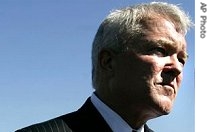2006年VOA标准英语-Foley Ethics Inquiry Completes Third Week(在线收听)
By Dan Robinson
Capitol Hill
26 October 2006
As members of Congress campaign for the upcoming legislative election, back in the U.S. Capitol a congressional ethics committee completed the third week of an investigation that could yet have a major impact on the November 7 vote.
----
 Mark Foley (file photo) |
||
After questioning everyone from the House Speaker, the Republican Majority leader, other lawmakers and senior staffers, it appears less and less likely any clear answers will emerge before the election.
Committee members are under strict guidelines not to speak to the media.
Committee ranking Democrat Howard Berman, explained this as the panel began its work.
"In terms of confidentiality and process, we are going to operate, we think we have to operate in the traditional way of doing our investigation quietly and without announcement - until we're finished," said Howard Berman.
But every witness who did speak with reporters camped outside the committee room has asserted they told the truth to investigators.
House Speaker Dennis Hastert's explanations of who told him what, and when about Foley's inappropriate sexually-explicit Internet messages to congressional pages have been at odds with accounts provided by others.
"I thank the committee to prompt action, for moving forward on this inquiry," he said. "They did so. I answered all of the questions they asked, to the best of my ability. I also said they need to move quickly to get to the bottom of this issue, including who knew about the sexually-explicit messages and when they knew about it. So they needed to make sure they ask all the question of everybody."
Hastert's Chief of Staff, Scott Palmer, has also gone before the panel, as has Tom Reynolds, the Republican lawmaker who also insists on the accuracy of his version of events.
Among the many accounts, the most conspicuous remains one by former congressional aide Kirk Fordham who asserts he informed senior Hastert aides three years ago about Foley's inappropriate behavior. Hastert denies having had any early knowledge, or says he can't recall specific conversations.
Although some individual testimony has lasted as long as six hours, secrecy has been such that it is difficult at this point to have a sense of what the inquiry has uncovered.
What is possible, despite less media attention as the inquiry has dragged on, is to assess the potential political impact so far for Republicans and Democrats fighting it out for votes on November 7th.
Some campaign appearances by Hastert, Majority Leader John Boehner, and Congressman Reynolds, who heads the Republican Congressional Campaign Committee, had to be curtailed as a result of the Foley investigation.
Facing a strong Democratic challenger in his home district in New York State, Reynolds was forced to air an apologetic campaign ad regarding his role in the Foley scandal.
Reynold's approval numbers have recovered somewhat, and he recently expressed optimism Republicans might even hold on to the Florida House seat vacated by Foley, one political analysts rank as one of the four most vulnerable in the nation for Republicans.
"It is a good Republican seat, and one that based on the circumstances of this campaign leads us to a very good opportunity of seeing if we can't capture it because it holds that Republican strength," said Tom Reynolds.
Democrat Chris Van Hollen disagrees, saying Republicans will have a hard time in key congressional races as a result of ethics issues.
"Look at the seats we're talking about [Republican Congressman] Bob Ney, [former Republican Majority Leader] Tom DeLay, Mark Foley," said Chris Van Hollen. "And you wonder why the American people are fed up, and you wonder why there is a very important national component to this election if you want to hold people accountable."
The references are to Ohio Republican Bob Ney who pled guilty to corruption charges linked to the Jack Abramoff lobbying scandal, and faces expulsion from the House, and Tom DeLay, the former Majority leader who stepped down as he faced criminal charges in Texas, and ethics issues also related to Abramoff.
As the inquiry goes into a fourth week, it's not known if the bipartisan panel will issue a preliminary report.
If such a report were to contain findings that raise new questions about the actions of Republican House leaders, it might refocus voter's attention on the issue of congressional ethics just days before the November 7 election.
On the campaign trail, Republican lawmakers continue their efforts to move attention of voters away from the Foley scandal and toward such key Republican issues as the war on terrorism and border security.
For Democrats, the Foley scandal remains a potent part of their attempts to keep the spotlight on Republican ethical lapses during the 109th Congress, even as President Bush's handling of the situation in Iraq looms ever larger in the days before the November 7 election.